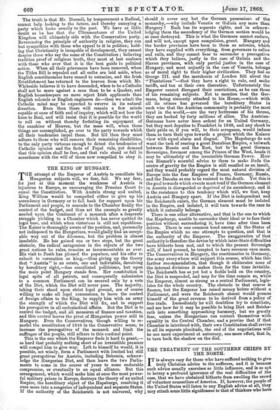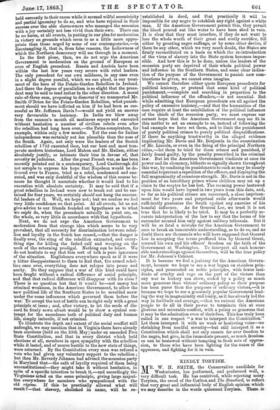THE TREATMENT OF THE SOUTHERN CHIEFS BY THE NORTH.
IT is always easy for those-who have suffered nothing to give truly Christian advice to the sufferers, and it is because such advice usually exercises so little influence, and' is so apt to betray a profound ignorance of the real difficulties of the case, that we have abstained hitherto from swelling the crowd of-volunteer counsellors of America. If, however, the people of the United States will listen to any English advice at all, they may attach some little significance to that of thinkers who have held earnestly to their cause while it seemed wilful eccentricity and partial ignominy to do so, and who have rejoiced in their success over the able slaveowners who managed the secession with a joy certainly not less vivid than their own. There can be no harm, at all events, in putting in our plea for moderation in victory on grounds which seem to us a little more appro- priate than those urged by some of our contemporaries,—in disentangling it, that is, from false reasons, the hollowness of which the Northern democracy will see through in a moment. . In the first place, then, we do not urge the American Government to moderation on the ground of European or even of English precedent. Russia and Austria have been within the last few years very severe with rebel leaders. The only precedent for our own mildness, in any case even in a slight degree parallel, which we can plead, is our treat- ment of the hero of the Potato-Garden Rebellion in Ireland.
And there the degree of parallelism is so slight that the prece- dent may be said to tend rather in the other direction. A moral rule-of-three sum, proposing to discover if we transported Mr. Smith O'Brien for the Potato-Garden Rebellion, what punish- ment should we have inflicted on him if he had been as suc- cessful as Mr. Jefferson Davis ?—would not yield an answer very favourable to leniency. In India we blew away from the cannon's mouth all mutinous sepoys and executed without hesitation a number of civilian rebels even after the rebellion had long been over,—the Patna conspirators, for example, within only a few months. Yet the case for Indian independenoe was certainly not less plausible than the case of the South. Again, not only were the leaders of the Scotch rebellion of 1745 executed then, but our best and most tem- perate modern historians, Lord kahon and Mr. Hallam, either absolutely Flustify, or intimate their bias in favour of, that severity's l judicious. After the great French war, as has been recently pointed out in a contemporary, Lord Castlereagh did not scruple to express his hope that Napoleon would be de- livered over to France, tried as a rebel, condemned and exe- cuted, and was only doubtful of the wisdom of this course be- cause he thought it uncertain whether it would lead to his execution with absolute certainty. It may be said that if a great rebellion in Ireland were now to break out and be sus- tained for four years, we certainly should not hang the success- ful leaders of it. Well, we hope not ; but we confess we feel very little confidenc&on that point. At all events, let us not give:advice to.our friends founded on hypotheses as to what we might do, when the precedents actually in point are, on the whole, so very little in accordance with that hypothesis.
Next, we do not urge the American Government to moderation from that strange idea which seems to be very prevalent, that all necessity for discrimination between rebel- lion and loyalty in the South has ceased,—that the danger is finally over, the sting of the rebellion extracted, and every- thing ripe for killing the fatted calf and weeping on the neck of the returning prodigal... Nothing can be falser. We do not hesitate to say that this. sort of talk is pure ignorance of the situation. Englishmen everywhere speak as if it were a bitter disappointment to them to find that, the armed rebel- lion once over, everything does not relapse into peace and amity. Do they suppose that a war of this kind could have been fought without a radical difference of social principle, and that that radical difference will disappear with its close ? There is no question but that it would 'be—not mercy but criminal weakness, in the American Government, to allow the new political life of the Southern States to be moulded anew under the same influences which governed them before the war. To' adcept the4est of battle can beright only with agreat principle at issue ; and, after victory, to let the seeds of dis- cord be freely sown afresh would be to show a cynical con- tempt for ' the sacredness both of political duty and human life, simply imbecile, if not criminal. To illustrate the depth and extent of the social conflict still, unfought, we may mention that.in Virginia there have already been elections (held on the. 25th May) under an amended Free State Constitution, and that in every district which held elections at all, members in open sympathy with the rebellion while it lasted, and of course hostile to the new state of things, were returned. By the Constitution every man was refused a vote who had given any voluntary support to the rebellion ; but then Mr. Reverdy Johnson had advised the secession party in Maryland that—the oath of loyalty required of them being unconstitutional—they might take it without hesitation, in spite of a specific intention to break it,—and accordingly the Virginians acted on the same -principle, giving large majori- ties everywhere for members who sympathized with the old regime. If this be practically allowed what will result ?—that slavery, abolished in name, will be re- established in deed, and that practically it will be impossible for any negro to establish any right against .a white man. If the American Government permit this, they permit the blood poured out like water to have been shed in vain. It is clear that they must interfere, if they do not want to lose the whole worth of their great and costly sacrifice, till either by granting negro suffrage, or by some other device, if there be any other, which we very much doubt, the States are firmly reconstituted on a basis on which the re-introduction of the virus of slavery into the State system becomes impos- sible. And how this is to be done, unless the leaders of the secession party are deprived of their whole political power and influence in the Southern States, and some clear indica- tion of the purpose of the Government to punish new com- binations be given, we cannot even imagine.
We cannot therefore either quote European precedents for political leniency, or pretend that some kind of political punishment,—complete and searching in proportion to the political influence of the offenders,—is not essential. But- while admitting that European precedents are all against the policy of excessive leniency,—and that the humanities of the case require at least the annihilation of the political influence of the chiefs of the secession party, we must express our earnest hope that the American Government may see fit in this matter to set an example to us, instead of following, the bad example we have set them, and to limit the punishment of purely political crimes to purely political disqualifications. If there be anything trustworthy in the alleged evidence implicating Mr. Davis and Mr. Benjamin in the assassination of Mr. Lincoln, or even in the firing of the principal Northern cities, let them be tried for these crimes and punished, if fairly found guilty, by the penalty prescribed in the criminal law. But let the American Government vindicate at once its power and its clemency, hitherto so signally shown throughout this war, by confining its punishments to such as may be clearly essentialto prevent a repetition of the offence, and displaying the full magnanimity of conscious strength. Mr. Davis is not in the position of an hereditary prince whose children may set up a claim to the sceptre he has lost. The seeming power bestowed upon him would have lapsed in two years from this date, and, so far as his political crimes are concerned, a close imprison- ment for two years and perpetual exile afterwards would sufficiently guarantee the South against any exercise of his baneful influence. As for General Lee, we trust it is not true that he is likely to be tried. It may be a perfectly ac- curate interpretation of the law to say that the terms of his surrender secured him only against military tribunals. But it will be as fatal a mistake for the American Government to seem to break an honourable understanding, as to do so, and no doubt there are thousands who will have supposed that General Lee in accepting the terms proffered him by General Grant, secured his own. and his officers' freedom on the faith of the Government at Washington. To interpret all such honour- able understandings against themselves, will be the true policy for Mr. Johnson's Cabinet.
It is because we feel a jealousy for the American Govern- ment, because we hope to see a war begun on stainless prin- ciples, and prosecuted on noble principles, with fewer inci- dents of cruelty and rage on the part of the victors than any war in history can show, ended by a policy as much more generous than victors' ordinary policy as their purpose has been purer than the purposes of ordinary victors,—it is because we hope to see a genuinely popular Government lead- ing the way in magnanimity and lenity, as it has already led the way in fortitude and courage,—that we entreat the American people to do all in -their power to terminate this at once gloriousand miserable conflict, with a policy so generous that it may be the admiration even of their foes, This has truly been called in one respect " a war to interpret the Constitution." Let them interpret it with no weak or hesitating voice—no shrieking from needful severity—bat still interpret, it as a. Constitution which shall not only ensure for ever freedom to the negro, but give, in the immediate present, as much .freedom, as Call be bestowed without tempting to fresh acts of oppres- sion, to those who have been fighting for the cause of the oppressor, and fighting for it in vain.































 Previous page
Previous page